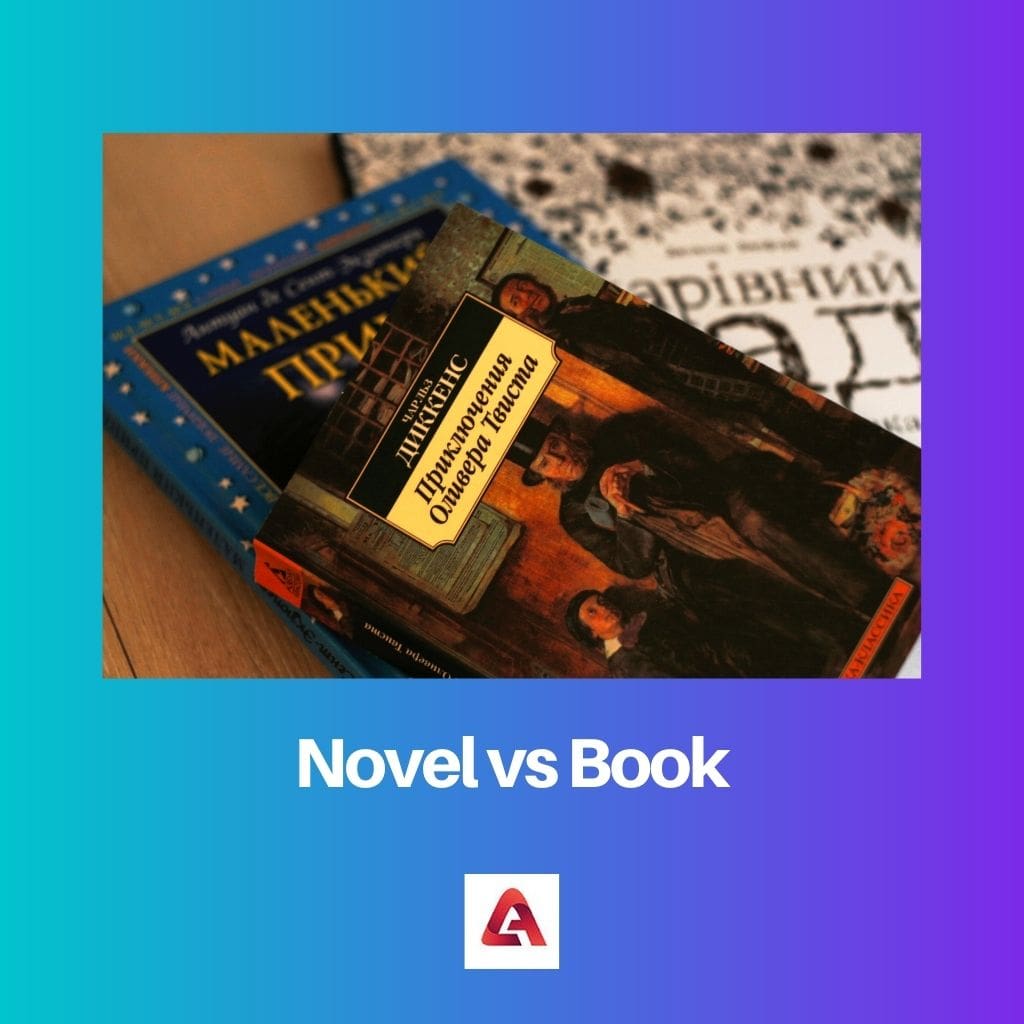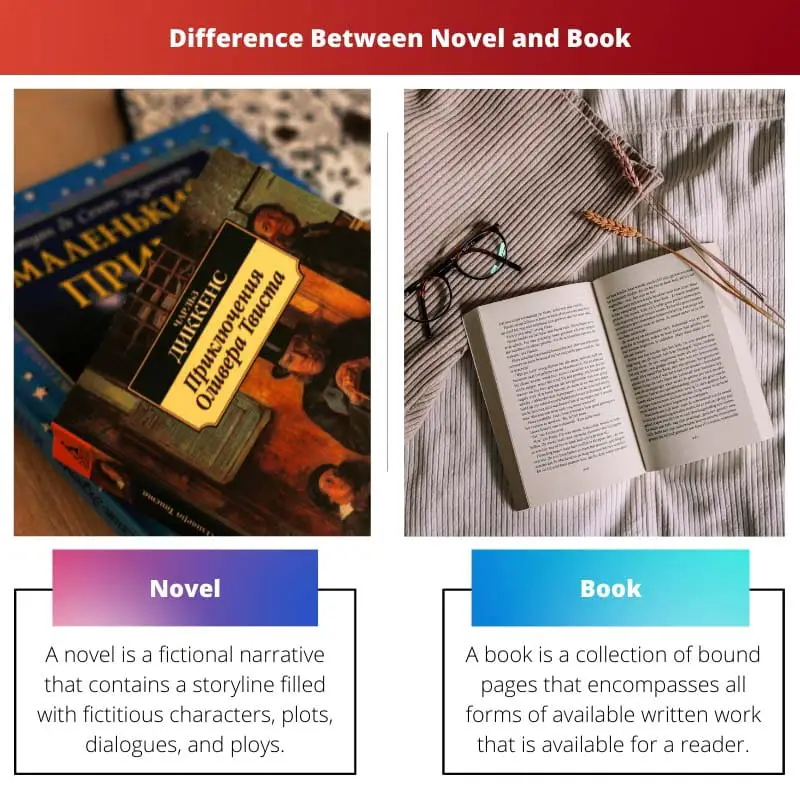A novel is a fictional narrative typically of significant length, exploring complex characters and intricate plots to convey broader themes or emotions. In contrast, a book is a more general term encompassing various written works, including novels but also covering non-fiction, poetry, and other literary forms.
Key Takeaways
- A novel is a long fictional narrative written in prose that tells a story with developed characters, settings, and plots.
- A book is a broad term encompassing any written or printed work consisting of pages bound together, covering various genres and formats, including novels, nonfiction, poetry, and reference materials.
- The main difference between the two is their content: a novel is a specific type of book that features a fictional story, while a book can encompass any written work, including novels.
Novel vs Book
The difference between a novel and a book is that every novel is a book, but every book is not. Novel illustrations are written on book pages, but books can be of any category.

A novel is a fictional narrative incorporating multiple fictitious characters and an imaginative storyline. It is primarily a way of exploring human experience through an artistic viewpoint.
A book, by its basic definition, is just a bound collection of pages containing any information available. The introduction of e-books (online publications) has also brought in a new era of reading.
Comparison Table
| Feature | Novel | Book |
|---|---|---|
| Type of Content | Fictional narrative | Can be fictional or non-fictional |
| Structure | Focuses on plot, characters, setting, and theme | Structure varies depending on content (e.g., essays, poems, instructions) |
| Length | Typically exceeds 40,000 words (though this can vary) | No set length requirement |
| Purpose | Primarily for entertainment and emotional engagement | Can be for entertainment, education, information, or reference |
| Examples | To Kill a Mockingbird, Pride and Prejudice | Harry Potter (children’s novel), The World Almanac (non-fiction book), The Raven (poetry collection) |
What is Novel?
Historical Evolution of the Novel
Novels have a rich history that spans centuries, with their roots traced back to ancient storytelling traditions and early forms of written narratives. The term “novel” itself emerged in the 18th century, marking a departure from earlier forms of prose fiction like romances and epics. Notable milestones in the evolution of the novel include works such as “Don Quixote” by Miguel de Cervantes and “Robinson Crusoe” by Daniel Defoe.
Key Characteristics of Novels
Novels share several defining characteristics that distinguish them from other literary forms. These include:
1. Length and Complexity
Novels are typically longer than shorter forms of fiction, such as short stories or novellas. Their extended length allows for in-depth exploration of characters, plotlines, and themes, contributing to a more intricate narrative.
2. Prose Form
Unlike poetry, novels are written in prose, facilitating a more straightforward and expansive mode of storytelling. The use of prose allows authors to develop nuanced characters, detailed settings, and complex plots.
3. Narrative Structure
Novels often follow a structured narrative with a beginning, middle, and end. Various literary devices, such as foreshadowing, flashbacks, and multiple perspectives, are employed to enhance the storytelling and engage the reader.
Genres and Subgenres
Novels encompass a vast array of genres and subgenres, catering to diverse reader preferences. Some common genres include:
1. Literary Fiction
Known for its emphasis on character development and exploration of human experiences, literary fiction often delves into complex themes and social issues.
2. Mystery/Thriller
Novels in this genre focus on suspenseful and intriguing plots, often involving crime, detective work, or psychological twists.
3. Science Fiction/Fantasy
Speculative fiction explores imaginative and fantastical worlds, often incorporating elements of science, magic, or alternative realities.
Impact and Influence
Novels have a profound impact on society, shaping cultural perceptions, reflecting historical contexts, and influencing individuals’ perspectives. Many novels have become timeless classics, contributing to the literary canon and leaving a lasting legacy.

What is Book?
Components of a Book
1. Title Page
The title page is the first page of a book, providing crucial information such as the title, author’s name, publisher, and sometimes the publication date.
2. Table of Contents
The table of contents lists the chapters or sections of the book in order, enabling readers to navigate and locate specific content easily.
3. Introduction
The introduction sets the tone for the book, offering background information, outlining the purpose, and preparing readers for the content ahead.
4. Chapters or Sections
Books are typically divided into chapters or sections, each focusing on specific themes or aspects of the overall subject matter.
5. Text Body
The main body of the book contains the primary content, including narratives, explanations, arguments, or any other form of information intended for the reader.
6. Illustrations and Graphics
Many books include illustrations, diagrams, charts, or other visual elements to enhance understanding and engagement.
7. Conclusion
The conclusion summarizes key points, reinforces the main message, and often provides closure to the book.
8. Bibliography or References
Books often include a list of references, acknowledging sources and providing additional resources for readers interested in further exploration.
9. Index
The index is an alphabetical list of keywords or topics along with page numbers, aiding readers in quickly finding specific information within the book.
Types of Books
1. Fiction
Fictional books are creative works of the imagination, encompassing genres like novels, short stories, and poetry.
2. Non-Fiction
Non-fiction books present factual information and real events, covering genres such as history, science, biography, and self-help.
3. Reference Books
Reference books provide quick access to specific information, such as dictionaries, encyclopedias, and atlases.
4. Textbooks
Textbooks are educational materials designed for classroom use, covering a range of academic subjects.
5. E-books
E-books are digital versions of printed books, accessible on electronic devices like e-readers, tablets, and smartphones.
Evolution of Books
1. Manuscripts
Before the invention of the printing press, books were handwritten manuscripts, often laboriously produced by scribes.
2. Printing Press
The Gutenberg printing press revolutionized book production in the 15th century, making books more accessible to a broader audience.
3. Digital Age
The advent of digital technology led to the creation of e-books, audiobooks, and online publishing platforms, transforming the way books are produced and consumed.
Impact of Books on Society
1. Knowledge Transfer
Books have played a crucial role in preserving and transmitting knowledge across generations.
2. Cultural Influence
Books contribute to the development and preservation of cultures, traditions, and languages.
3. Education
Books are essential tools in formal education, serving as primary sources of information for students.
4. Entertainment
Fictional books provide entertainment and escapism, allowing readers to immerse themselves in different worlds and experiences.

Main Differences Between Novels and Books
- Definition:
- A novel is a specific type of book, typically a work of fiction, that tells a long and complex narrative story involving characters, events, and a plot.
- The term “book” is a more general term that encompasses various written or printed works, including novels, non-fiction, poetry, and other literary forms.
- Length:
- Novels are usually longer works of fiction, with a typical length ranging from 40,000 to 100,000 words or more.
- Books, as a broader category, can include works of varying lengths, such as short stories, novellas, and longer novels, as well as non-fiction works.
- Genre:
- Novels can belong to various genres, including romance, mystery, science fiction, fantasy, historical fiction, and more.
- Books encompass a wide range of genres and can include novels, biographies, essays, reference books, poetry collections, and other literary forms.
- Purpose:
- Novels are primarily written for entertainment and storytelling purposes, aiming to engage readers emotionally and intellectually.
- Books, being a broader term, can serve different purposes, including education, information, reference, and entertainment. They are not limited to fiction.
- Narrative Style:
- Novels often have a narrative structure with characters, setting, conflict, and resolution, emphasizing storytelling elements.
- Books may have a narrative structure, but this varies widely depending on the genre and purpose. Non-fiction books, for example, may be more informative or analytical than narrative.
- Examples:
- Examples of novels include “Pride and Prejudice” by Jane Austen, “1984” by George Orwell, and “To Kill a Mockingbird” by Harper Lee.
- Examples of books can include novels like those mentioned above, but also non-fiction works like “The Elements of Style” by Strunk and White, or reference books like dictionaries and encyclopedias.

- https://books.google.com/books?hl=en&lr=&id=rn46AAAAIAAJ&oi=fnd&pg=PR9&dq=Novel+and+Book&ots=DJMlLIdVPB&sig=66tlDXoN-m95G7YcIiIwzkxM7Nc
- https://deepblue.lib.umich.edu/bitstream/handle/2027.42/66651/10.1177_016502548801100407.pdf?sequence=2

This article gave a comprehensive comparison between novels and books, covering their origin, content, and genres. It’s a great resource for literature enthusiasts.
I agree, it’s an informative read for those interested in literature and literary forms.
This article is a great reference point for those who are confused about the differences between novels and books. The detailed comparison is beneficial for anyone interested in literature.
I couldn’t agree more, the comparison table is very helpful in understanding the nuances between novels and books.
The comparisons made here are clear and concise, making it easy to understand the distinction between novels and books. It’s a well-researched and well-written article.
Absolutely, the article provides valuable insights and knowledge about the literary world.
The informative nature of this article makes it a valuable resource for those exploring the world of literature and literary forms.
Absolutely, the article provides a wealth of knowledge for literature enthusiasts and curious minds alike.
The article presents a well-structured and insightful comparison between novels and books, catering to a wide range of literary interests.
The inclusion of varied genres and the historical context adds depth to the understanding of novels and books.
The article effectively captures the essence of both literary forms and offers valuable information.
The way the article delves into the historical aspects of novels and books is fascinating. It makes for an engaging and educational read.
Absolutely, the historical insights add depth to the understanding of these literary forms.
The article’s detailed analysis and historical insights make it a compelling and intellectually enriching read for all literature enthusiasts.
The well-researched content and clarity in comparisons make it a worthwhile read for anyone interested in literature.
I completely agree, the article offers a fascinating perspective on the evolution of literary forms.
I feel that the definitions and explanations in this article can help anyone understand the differences between novels and books, even for those not well-versed in literature.
The historical context added to the article makes it even more compelling and insightful.
Definitely, the details provided here are very informative and can be easily comprehended.
The article presents a coherent and comprehensive analysis of the differences between novels and books, providing valuable literary knowledge.
The historical context and comparison table bring a rich understanding of the evolution of literary forms.
Indeed, it’s a well-researched piece that offers insightful information for readers.
The detailed comparison and historical references in the article make it an educational and intellectually stimulating piece.
It’s a thought-provoking read that provides clarity on the distinctions between novels and books.